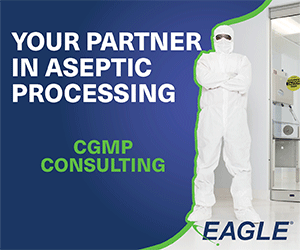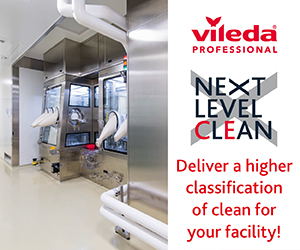How often do you think about the floor in your cleanroom and controlled environment? Chances are it's quite often and changes in legislation - and maybe a change of production usage or methods - mean that floor finishes may have to be upgraded.
A new floor may be required to resist chemical or solvent spills or other risks of contamination. Or a change of usage could mean the floor has to be ESD to control static discharge.
Flooring experts can help with the specification process and will typically ask lots of questions before making any recommendations and developing the design.
Caustic solutions for CIP and solvents can seriously damage standard resin floors
Key considerations that should always be pointed out in the early stages of all potential projects include operational and maintenance requirements, installation and aesthetics - all of which are necessary to meet the stringent measures used to control particles to ultra-clean ISO standards.
Here are some of the most common questions and decisions that we ask to assess these and all of our healthcare and pharmaceutical clients during our initial meetings.
Meeting rigorous cleaning demands
To remove any spores in the air and to kill airborne germs, pharmaceutical sites tend to fumigate to control the microbial contamination in specialist areas.
This essential cleaning can be aggressive on certain floor finishes and vinyl. Certain epoxy and polyurethane systems are always recommended for these types of projects as they're more durable and better able to withstand the very rigorous demands of such processing facilities.
Chemical resistance
In many areas, chances are that the floor doesn't necessarily need to be chemically resistant, but there will be areas where it is extremely important.
Caustic solutions for CIP and solvents can seriously damage standard resin floors, which is why it's important to state what products are spilt - as well as their concentrations and temperatures - so that the correct level of protection can be specified. A lot of our systems can be enhanced with fiberglass reinforcement, which provides extra impact protection if required. Fiberglass reinforced "positive" side waterproofing membranes are another option to protect very important structural concrete floors or mezzanines, for example, from water ingress costs and associated costs.
A good supplier can manage a flooring project within the demands of a busy production environment
Every flooring solution in cleanrooms and controlled environments should also be Current Good Manufacturing Practice (cGMP) compliant and installed using low Volatile Organic Compounds (VOC).
Current Good Manufacturing Practice is all about making sure that a facility is fit for purpose and will not pose a risk to the operation or the product. This is, of course, absolutely essential.
Seamless
Whether the floor can be seamless depends. If the structural floor slab has been designed to have some movement and has expansion joints, the answer is no. However, by using a "crack bridging" systems and full floor waterproofing layers with the appropriate final floor finishes, we're able to achieve a truly seamless floor.
Eliminating joints means there is less risk of the floor breaking down due to traffic and, very importantly, it reduces the opportunity for bacterial growth.
Making sure that there are only smooth surface transitions - as well as having mechanical protection of the floor and cove - is critical to protect against the more serious problem of bacterial infection in any of the transition points.
Is ESD flooring needed?
Some flooring solutions in pharma facilities need to be ESD rated - for instance, if solvents are being handled or there maybe nuisance dust to consider. Even the use of FLT's can generate very high levels of static that has to be controlled.
Within our range, we have numerous ESD flooring solutions to help control static. They can be decorative and even have enhanced chemical resistance.
Slip-resistance?
You don't want anyone to slip in your cleanroom, so make sure you specify textured, non-slip-resistant flooring solution.
It can be manufactured and installed in a variety of finishes and textures to help reduce slipperiness and increase traction. It goes without saying that it's extremely important when it comes to protecting employees, customers and visitors.
The look
You don't have to be restricted on choice of colours and decorative blends and finishes in a sterile environment. Select a manufacturer that can offer a wide enough selection to meet every aesthetic demand and, very importantly, all performance prerequisites.
Complementary drainage solutions?
We always recommend complementing sterile flooring systems with pharma-grade stainless-steel gullies and drainage solution from reputable, experienced manufacturers. Ideally, partner with a supplier that offers bespoke-manufactured products that are able to withstand the harsh cleaning regimes that such sterile environments demand.
Pharma-grade gullies should offer fully sealed tops that can be opened after specific spillages - that perhaps can't go straight to drain - so that they can be cleared away or neutralised.
Kerbs and walls
For the ultimate sterile and hygienic solution, we always recommend complementing seamless, non-porous flooring with prefabricated highly durable and water-resistant kerb and wall systems. There's been plenty of innovation in this space and a good flooring specialist will be able to supply the latest kerbs and wall systems to deliver maximum protection from water and germ infiltration.
Investment in this area will mean there are no cavities behind the skirting boards or kerbs, which means there’s no place for germs and bacteria to develop. Joints are finished with an advanced germ-free sanitary sealant and installation is quick and easy.
We also recommend to customers that walls are treated with a totally seamless and non-porous fibreglass reinforced resin system, which again are available in a wide range of colours, sheens and finishes. This is a hard-wearing coating that's able to withstand the rigours of high-pressure cleaning. It's also chemical and impact resistant, making it ideal for ultra-sterile environments.
Certification and quality
Another thing to look for is to a contractor who complies with all the necessary health and safety standards for both public and private sector contracts. A good supplier also needs to be experienced in managing a flooring project within the demands of a busy production environment. They should be able to minimise downtime by working weekends, nights and during shutdowns. And by using the latest fast-curing, taint-free flooring solutions, it should be possible to return to normal working conditions quickly and cost-effectively, with minimal disruption. So let's take a look at some scenarios...
Case Study #1 - Alltrista Plastics
Alltrista Plastics is a US-based specialist manufacturer of high-end technical plastic moulding solutions for medical, pharma, nutraceutical and specialty packaging. The company operates ISO Class 8 certified cleanroom moulding and assembly facilities in its heavy-duty warehousing environment.
To increase its packaging production capabilities, Kemtile's brief involved the refurbishment of an existing warehouse facility into high grade cleanrooms, the flooring in which was an asphalt finish over a concrete slab. Over a two-month period, racking was stripped out of the warehouse before the asphalt was then planed down to the base slab. Kemtile's flooring team then installed a total of 2000 sqm high-performance epoxy flooring systems throughout the new pharma production facility and cleanroom.
A further 1200 sqm was laid in the new warehouse with a four-component power troweled mortar applied to withstand rigorous demands of forklift traffic and provide excellent abrasion, wear and chemical resistance.
In the cleanrooms an epoxy quartz mortar was applied. This durable flooring system has a decorative slip-resistant surface.
Ideal for trowel application over rough substrates, this base also provides superior impact resistance. Meeting the aesthetic requirements of the client brief, a quartz-coloured top layer of was applied to produce an attractive floor surface that is also lightly textured for safety.
Case Study #2 - Volac
Volac is an international dairy nutrition business. This flooring design and installation project, at the company's Felinfach plant in Ceredigion, West Wales, saw Kemtile reunite with Whitland Engineering to build a new dryer tower that will increase capacity at this modern dairy production facility.
Using the latest membrane filtration and drying technologies, the plant produces Volac's high-performance whey protein isolates for the sports and active nutrition markets, lactose for use in a range of food applications and base powders for young animal milk formulas.
The site is also powered by a low-emission biomass CHP energy centre, helping to deliver a minimal carbon footprint. For this particular project, Kemtile specified 1576 sqm Stonhard Stonclad GS over four floors. This high-performance epoxy system cures to an extremely hard, impact-resistant mortar and offers the benefits of abrasion, wear and chemical resistance. The Stonclad GS epoxy resin was then finished with Stonkote HT4 - a chemically resistant and hardwearing topcoat with a texture 2 surface profile for slip resistance, which makes it particularly suitable for this processing environment. Its addition further improves cleanability and aesthetics as it hardens to an attractive gloss finish and increases resistance to damage from abrasion and chemical spillages.
These specifications were complemented with 834 sqm of Kagetec GFK - a hygienic tiled floor system with the benefits of quick installation and high mechanical, load-bearing properties, resistant to thermal shock. Kemtile's co-polymer screed provided the base for the project and a stainless-steel gulley system and drainage channels, manufactured by from Wiedemann-Technik, were also installed.
Kemtile is now a division of Stonhard, the global specialists in pharmaceutical and healthcare flooring that manufacture, design and install. "We're working with an increasing number of leading international brands in the UK. We're proud to call the likes of AstraZeneca, Reckitt Benckiser, GSK. Accord Healthcare, Alltrista Plastics and Thermo Fisher Scientific our customers."





